Related Research Articles

Cheap Trick is an American rock band from Rockford, Illinois, formed in 1973 by guitarist Rick Neilsen, bassist Tom Petersson, lead vocalist Randy Hogan and drummer Bun E. Carlos. The current lineup of the band consists of frontman Robin Zander, Nielsen and Petersson.

Cheap Trick at Budokan is a live album released by Cheap Trick in 1978 and their best-selling recording. After several years of constant touring but only middling exposure for the band, At Budokan steadily grew off radio play and word-of-mouth to become a high-selling success, kickstarting the band's popularity and becoming acclaimed as one of the greatest live rock albums of all time and a classic of the power pop genre.
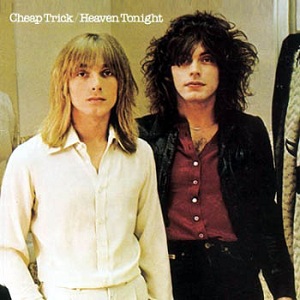
Heaven Tonight is Cheap Trick's third studio album, produced by Tom Werman and released in 1978. The album was remastered and released with bonus tracks on Sony's Epic/Legacy imprint in 1998. The album cover features lead singer Robin Zander and bassist Tom Petersson on the front, with Rick Neilsen and Bun E. Carlos on the back.
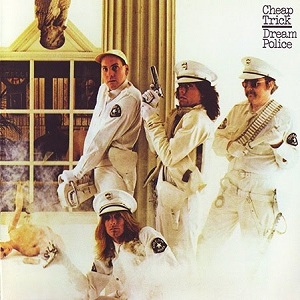
Dream Police is the fourth studio album by American rock band Cheap Trick. It was released in 1979, and was their third release in a row produced by Tom Werman. It is the band's most commercially successful studio album, going to No. 6 on the Billboard 200 chart and being certified platinum within a few months of its release.

Cheap Trick is the debut studio album by the American rock band Cheap Trick, released in 1977. It was released under Epic Records and produced by Jack Douglas, a frequent collaborator of the band. The album did not reach the Billboard 200 chart but did "bubble under" at number 207 for one week in April 1977.

Special One is the fourteenth studio album by the band Cheap Trick. It was released in 2003 to mixed reviews and features the single "Scent of a Woman." It charted for one week, reaching 128 on the album charts.

All Shook Up is the fifth studio album by American rock band Cheap Trick. Released in 1980, it was produced by former Beatles producer George Martin. As such, this was the first studio album since their debut to be produced by someone other than Tom Werman.
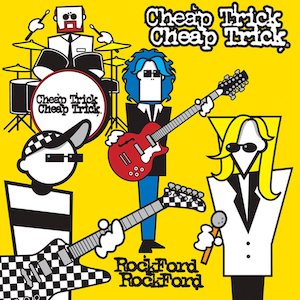
Rockford is the fifteenth studio album by Cheap Trick, released on June 6, 2006. The album's title refers to Rockford, Illinois, the band's hometown.

Busted is the eleventh studio album released by Cheap Trick, which was released in 1990 and peaked at number 44 on the US album charts. After the success of "The Flame" from the previous album Lap of Luxury, the band recorded Busted with a similar format, especially on the single "Can't Stop Fallin' into Love." The single peaked at number 12 on the US charts. The album failed to be as successful as the label had hoped, and about a year after the release of Busted Epic Records dropped Cheap Trick from their label. There were three videos shot for this LP; "Can't Stop Fallin' into Love," "If You Need Me," and "Wherever Would I Be."

The Greatest Hits is the first compilation album by Cheap Trick. It contains many of Cheap Trick's popular songs, as well as a previously unreleased cover version of The Beatles' "Magical Mystery Tour", which according to the liner notes, was an outtake from the Lap of Luxury album. Though it peaked at only #174 on the Billboard 200 albums chart, it remained a steady seller, and was certified platinum for one million U.S. shipments seven years after its release.

The Essential Cheap Trick is the fourth compilation album by Cheap Trick and part of Sony BMG's The Essential series. It contains at least one song from every album up to Special One, except the commercial failure The Doctor. A reissue in 2010, retitled "The Essential Cheap Trick: Limited Edition 3.0", added a third disc with seven additional songs.

"Dream Police" is a song written by Rick Nielsen and originally released in 1979 by the American rock band Cheap Trick. It is the first track on the group's album of the same name. The single peaked at #26 on the Billboard Hot 100. Nielsen has stated that the song "is an attempt to take a heavy thought - a quick bit of REM snatched right before waking up - and put into a pop format." He also stated that "the song was about Big Brother watching you."
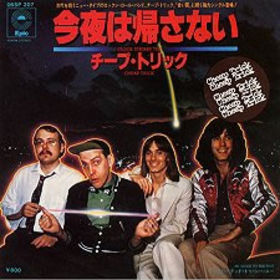
"Clock Strikes Ten" is a song released in 1977 by Cheap Trick on their second album, In Color. It was written by Cheap Trick guitarist Rick Nielsen. It was released as a single in Japan, where it was a major hit and reached No. 1 on at least one singles chart. Its success, as well as the success of two follow up singles, "I Want You to Want Me" and "Surrender", paved the way for Cheap Trick's famous concerts at Nippon Budokan in Tokyo in April 1978 that were recorded for the group's most popular album - Cheap Trick at Budokan.
"Hello There" is a song written by Rick Nielsen and first released on Cheap Trick's 1977 album, In Color. The song was also often used as the first song of Cheap Trick concerts, and as a result was the first song on the band's seminal live album Cheap Trick at Budokan.

"Voices" is a song written by Rick Nielsen and recorded by American rock band Cheap Trick which appeared on the album Dream Police. The single was released in 1979 and peaked at number 32 in the US. The single has become one of the band's more widely known tracks.
Need Your Love is a song written by Rick Nielsen and Tom Petersson that was originally performed by American rock band Cheap Trick. The song appeared on Cheap Trick's 1979 album Dream Police. A live version was included on the 1978 album Cheap Trick at Budokan, which initially appeared only in Japan but eventually was in the United States in early 1979. Because Cheap Trick was immensely popular in Japan, the band's Japanese label demanded that At Budokan include three new songs. The three songs were "Ain't That a Shame", "Goodnight Now", and "Need Your Love."

"Auf Wiedersehen" is a song co-written by Cheap Trick guitarist Rick Nielsen and bassist Tom Petersson and first released on the band's 1978 album Heaven Tonight. It was also released as a single as the B-side of "Surrender". Since its original release, it has also been released by Cheap Trick on several live and compilation albums, including Budokan II; Sex, America, Cheap Trick; The Essential Cheap Trick, and the 30th Anniversary Edition of Cheap Trick at Budokan, which also includes a DVD with a video performance of the song. Allmusic critic Stephen Thomas Erlewine described the song as one of the peaks of Heaven Tonight and as one of Cheap Trick's "stone-cold classics." It has often been used by the band to close their concerts. Since its original release, it has been covered by Anthrax, Cell, John Easdale, and Steel Pole Bath Tub.

"Way of the World" is a song by American rock band Cheap Trick, which was released in 1980 as a single from their fourth studio album Dream Police (1979). The song was written by Rick Nielsen and Robin Zander and produced by Tom Werman. In February 1980 it was released as a 7" vinyl single in the UK only, backed by "Oh, Candy," from the first Cheap Trick album, and peaked at #73. It attempted to capitalize on the success of the mid-1979 single "I Want You to Want Me" and the live album Cheap Trick at Budokan which both entered the top 30.
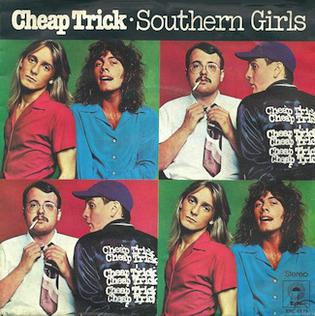
"Southern Girls" is a song written by Rick Nielsen and Tom Petersson that was first released by Cheap Trick on their 1977 album In Color, produced by Tom Werman. It was also released as a single. It has been covered by a number of artists, including Bangs, Everclear and Gilby Clarke.

"Stiff Competition" is a song written by Rick Nielsen that first appeared on Cheap Trick's 1978 album Heaven Tonight. It is famous for the sexual double entendres in the lyrics, and subsequently appeared on live and compilation albums. In the UK, "Stiff Competition" was the B-side to Cheap Trick's second single from Heaven Tonight, "California Man."
References
- 1 2 3 4 5 6 7 8 9 Hayes, M.; Sharp, K. (1998). Reputation Is a Fragile Thing. Poptastic. pp. 26, 53, 178. ISBN 978-0-9662081-0-8.
- ↑ Nielsen, R., Petersson, T. & Zander, R. "Cheap Trick High Roller lyrics". MetroLyrics . Retrieved 2014-02-17.CS1 maint: multiple names: authors list (link)
- ↑ Swanson, D. (May 23, 2014). "35 Years Ago: Cheap Trick's 'Heaven Tonight Album Released". Ultimate Classic Rock. Retrieved 2014-02-15.
- 1 2 3 Wawzenek, B. (September 4, 2010). "Saturday Night Special: Cheap Trick, Heaven Tonight". gibson.com. Archived from the original on January 24, 2013. Retrieved 2014-02-15.
- 1 2 Sled, B. (1993). Grimes, J. (ed.). Cd Review Digest Annual: Jazz, Popular, Etc, 1992. Schwann. p. 481. ISBN 9781879796096 . Retrieved 2013-02-15.
- ↑ Erlewine, S.T. "Budokan II". Allmusic . Retrieved 2014-02-15.
- ↑ Erlewine, S.T. "At Budokan [The Complete Concert]". Allmusic . Retrieved 2014-02-15.
- ↑ Wine, S. (June 17, 1998). "Cheap Trick at Budokan". Kentucky New Era . p. 10. Retrieved 2014-02-15.
- ↑ Erlewine, S.T. "Sex, America, Cheap Trick". Allmusic . Retrieved 2014-02-15.
- ↑ Erlewine, S.T. "The Essential Cheap Trick". Allmusic . Retrieved 2014-02-15.
- ↑ Ankeny, J. "Bloodsucker". Allmusic . Retrieved 2014-02-15.
- ↑ Strong, M.C. (2003). The Great Indie Discography. Canongate. ISBN 9781841953359.
- ↑ Robbins, I. & Sandlin, M. "Scrawl". Trouser Press . Retrieved 2014-02-15.CS1 maint: multiple names: authors list (link)